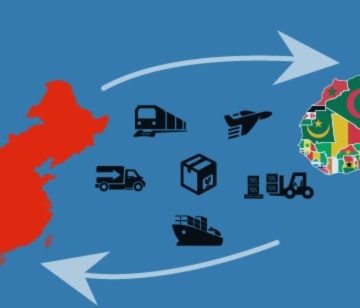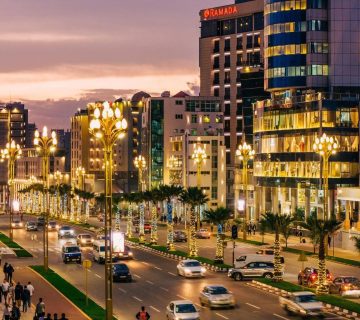After months of protests that started in December 2018 over the rising prices of basic goods such as bread and a declining economy, long-time Sudanese President Omar al-Bashir was overthrown and arrested on Thursday April 11, 2019. Bashir had been in power since he staged a military coup in 1989 that ousted the government of Sadiq al-Mahdi. His reign has not been without controversy. In March 2009, he became the first sitting president to be indicted by the International Criminal Court (ICC) for alleged human rights violations and war crimes in the western region of Darfur. Additionally, there have been widespread allegations of electoral fraud, corruption, human rights violations, and extrajudicial killings conducted by the powerful National Intelligence and Security Service (NISS) and armed groups loyal to Bahir, such as the Rapid Support Forces (RSF), which has its roots in the Janjaweed militia that carried out a campaign of violence in Darfur.
The protests were sparked by a sharp increase in prices of daily good such as bread, and a dwindling economy, but soon escalated in demands for Bashir to step down. In February, it looked like Bashir might step down, but instead he declared a state of national emergency and sacked some high-level officials. Human Rights Watch reported, before the protests escalated into a coup, that at least 51 people have died since December 2018. Other reports put the death toll since last weekend alone at 35 people. After four months of sustained massive protests and intense pressure from the army, it once again looked like Bashir would ‘voluntarily’ step down on Thursday. However, after the army made a public announcement on the same day, it became clear that it was a military coup, and the mood changed.
In a much-anticipated public announcement, Defence Minister and First Vice-President Ahmed Awad Ibn Auf said that Bashir had been overthrown and arrested, and that “the country has been suffering from poor management, corruption, and an absence of justice” for too long. Additionally, he said the army would oversee a two-year transitional period followed by elections. The news of Bashir’s toppling and arrest was received with celebrations in the streets of Khartoum. However, the two-year transitional period, overseen by a military council, has sparked widespread anger and resentment among protesters and attracted international condemnation. The military promptly put a three-month state of emergency in place, suspended the constitution, shut down border crossings until further notice, and closed the airspace for at least 24 hours. Celebrations were cut short and made way for further demonstrations, with protesters scanting “Fall, Again”, referencing their earlier slogan of “Fall, That’s All”. They argue that this coup is only a cosmetic change, a farce. Some stated to news agency AFP that it is “only a reproduction of the old regime”. Sudanese journalist Yousra Elbagir stated that “People are angry. They feel duped.” The Sudanese Translators for Change said that “The internal regime’s military coup by Ibn Auf is another regime trick aiming to reproduce itself. … Those who have ravaged our country and massacred its citizens intend to steal every drop of blood and sweat that the Sudanese people have shed in their glorious popular revolution.”
What has emerged now is a very dangerous and volatile situation with character traits of the late Arab Spring. In the spring of 2011, popular uprisings and massive peaceful protests erupted throughout the Arab world in which civilians called for their rulers to step down. All six of these uprisings descended in chaos however. For example, in Libya and Yemen, the state exploded, making place for warring militias and war lords, some backed by foreign powers, both regional and global, others by Islamic extremist groups such as ISIS or al Qaeda. Syria spiralled into chaos in a full-blown civil war where millions have been internally displaced or forced to flee the country, and hundreds of thousands have died. Egypt has arguably become more authoritarian than before, with Abdel al-Fattah el-Sisi, the military commander, taking power in what he described as a response to “the popular will”.
The case of Egypt comes to mind when prophesizing what will happen in Sudan. After sustained protests, President Hosni Mubarak was overthrown and replaced by the Supreme Council of the Armed Forces, which suspended the constitution and dissolved Egypt’s two legislative bodies, the People’s Assembly and the Consultative Assembly. A statement by the Supreme Council of the Armed Forces said that the military would remain in power for six months or until new elections can be held. In June 2012, the military council, still in place after more than a year, imposed martial law, and issued a supplementary constitutional declaration that placed severe restrictions on the powers of the incoming president and granted the Supreme Council of the Armed Forces sweeping legislative and executive powers and greater authority over the constitution-writing process. In 2013, el-Sisi overthrew the democratically elected Mohammed Morsi in a military coup.
In the case of Sudan, we once again witness a military takeover without a clear roadmap on how the military plans to hand over power to civilians. Logically, protesters are demanding a civilian transitional government. Fergal Keane, Africa Editor for the BBC, says that the military has the capacity for a crackdown and imposing brutal repressions, but what then? Sudan has a real opportunity for positive change, but a cosmetic transition as witnessed now would seriously destabilize the country further, potentially escalating in intense violence between the armed forces and protesters and putting the country on a path towards internal strife.
The outcome of the protests in Sudan (and simultaneously Algeria) can have significant regional or even continental implications. On the one hand, the destabilizing effects of a botched transition could seriously affect peace and stability in the Horn of Africa. Sudan is one of Africa’s biggest and strategically most important countries, linking Sub-Saharan Africa with the MENA region, and its destabilization could, for example, have an impact on the flow of migration, the security of immigrants, and Sudan’s involvement in Yemen. The Chairperson of the African Union Commission, Moussa Faki Mahamat, expressed the African Union’s conviction that the military take-over is not the appropriate response to the challenges facing Sudan and the aspirations of its people, yet Ibn Auf seems determined to go against the wishes of both international partners and the Sudanese people.
On the other hand, the fire of popular democracy could spread to countries with long-sitting presidents in the region, like Uganda, Eritrea, Chad, Burundi, Rwanda and Djibouti, or even further to Equatorial-Guinea, Cameroon, or Angola. The ripple-effects of a successful transition could inspire civilians in these countries to take to the streets to demand democratic change, possibly evolving in a regional or continental democratic movement in the form of an ‘African Spring’. In other words, are we witnessing a new dawn for both Sudan and Africa, or are we venturing towards an uncertain twilight?
Jules Swinkels is a Visiting Research Fellow at the HORN Institute.
Photo Credit: Getty Images



